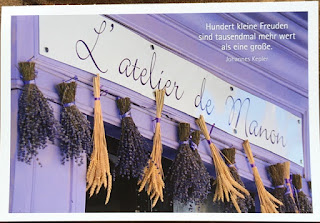This week's quotation is by Aristotle: "Freundschaft ist eine Seele in zwei Körpern". Which being translated, means: "Friendship is two souls in one body." And I have been truly blessed in my friends.
What are the qualities of a good friend? I believe that they include compassion, love, kindness and loyalty.
So what might compassion
look like in the context of friendship? It means trying to put yourself into your
friend's shoes, to really understand how they are feeling, so that you can
respond appropriately to their joys and concerns. It doesn't mean feeling sorry
for them, or trying to "make it all better". It means truly being
there for them when they need you, whether it is to celebrate or commiserate.
Love in friendship is the
same as it is in any other relationship. Love
is an amazing thing. I very much like science fiction author Raymond Feist’s
definition: “Love is a recognition, an opportunity to say ‘There is something
about you I cherish.’ It doesn’t entail marriage, or even physical love.
There’s love of parents (to which I would add love of family), love of city or
nation, love of life, and love of people. All different, all love.”
And
love is fundamental to human well-being. I am sure we can all remember those
sad, sad photos of those little children in Romanian orphanages, left in their
cots 24/7, with no attention paid to them, who had withdrawn into themselves,
totally unable to relate to anyone else, because they had been starved of love
and attention. And it is well known that in bringing up children, even “bad
attention” is better than being ignored.
I
would go so far as to say that we can only become fully rounded people if we
love and are loved in return. Jesus recognised this when he described “Love
your neighbour as yourself” as one of the two greatest commandments.
Building
loving relationships with all the people we come into contact with may sound an
unrealistic proposition, but stick with it; the rewards are beyond compare.
Starting from where you are is the important thing, and building up slowly.
Resolving to live your life in a spirit of love means recognising that there is
“that of God in everyone”, to use a Quakerly phrase.
Kindness
in friendships is closely related to compassion. It means responding to the
best in another person, and forgiving the worst. It means making a positive
difference to their lives, by small acts of kindness - remembering to send a
birthday card, giving them a ring "just because", listening with the
ear of your heart, and knowing them well enough to tiptoe round their tender
spots and rejoice with them when they are happy.
And
kindness need not be limited to friends. Let me tell you a true story, about
the effect of a random act of kindness: It is amazing
how little it takes to make a difference to the feel and shape of someone's
day. A while ago I went to visit a friend in hospital, and, as is customary (or
so I thought) I took her a bunch of flowers. Only to learn that flowers on
wards are now strictly forbidden because of "water contamination". So
I had to take them away again. But at least my friend realised that I had been
thinking of her.
My original thought had been to stick them back on the back seat of my car, and
take them back home with me. But then, at the main entrance to the hospital, I
walked past two women (I guess mother and grown-up daughter) who were obviously
waiting for a taxi or something. On impulse, I presented the older lady with
the flowers. And her whole face lit up: "It's my birthday on Monday!"
she said. So I wished her a happy birthday and went on my way.
I love the words of Frederick Buechner about how we act towards
strangers can have a real knock-on effect. he writes: "As we move around
this world and as we act with kindness, perhaps, or with indifference or with
hostility towards the people we meet, we are setting the great spider web
atremble. The life I touch for good or ill will touch another life, and that in
turn another, until who knows where the trembling stops, or in what far place
my touch will be felt."
It is lovely to think that perhaps my gift of flowers to that woman might have
that sort of impact on her day, and hence on those around her. It also made my
day - her happiness made me feel good! It is amazing how little it takes to
make a difference - to my life, and to that of others.
Loyalty in friendships is such an important thing. The sticking
point of any friendship will come when your friend does or says something you
cannot be happy about. If your friendship is true, you may be disappointed in
them, but will still try to understand where they are coming from, and stand by
them. A friend who deserts their friend at a time when things go wrong is a
weak and feeble friend at best. The loyalty of one true
friend can make an enormous difference to how one copes in a crisis. If just
one person stands by you through thick and thin, it can make life bearable. To
take an example from the Harry Potter books, Harry is gutted when his best
friend Ron turns against him in The
Goblet of Fire, because he (Ron) believes that Harry put his name into the
goblet and didn't share how to do this. It is only because his other best
friend, Hermione, stands by him, that he gets through the next difficult weeks.
Compassion, love, kindness and loyalty... that is what friendship means to me.




































